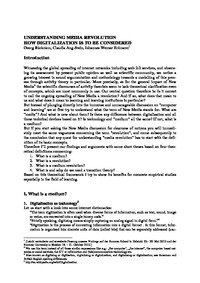Understanding Media evolutionHow Digitalization is to be considered
Publikationsdatum:
|
 |
 Diese Seite wurde seit 13 Jahren inhaltlich nicht mehr aktualisiert.
Unter Umständen ist sie nicht mehr aktuell.
Diese Seite wurde seit 13 Jahren inhaltlich nicht mehr aktualisiert.
Unter Umständen ist sie nicht mehr aktuell.
 Zusammenfassungen
Zusammenfassungen
Witnessing the global spreading of internet networks including web 2.0 services, and observing its assessment by present public opinion as well as scientific community, we notice a
growing interest in sound argumentation and methodology towards a modelling of this process
through activity theory in particular. More precisely, as for the general impact of New
Media2 the scientific discourses of activity theorists seem to lack theoretical clarification even
of concepts, which are most commonly in use. Our central question therefore is: Is it correct
to call the ongoing spreading of New Media a revolution? And if so, what does that mean to
us and what does it mean to learning and learning institutions in particular?
But instead of plunging directly into the immense and unmanageable discussion on “computer and learning” we at first try to understand what the term of New Media stands for. What are “media”? And what is new about them? Is there any difference between digitalization and all those technical devices based on it? Is technology and “medium” all the same? If not, what is a medium?
But if you start asking the New Media discussion for clearness of notions you will immediately meet the same vagueness concerning the term “revolution”, and come subsequently to the conclusion that any quest for understanding “media revolution” has to start with the definition of its basic concepts.
Therefore I’ll present our findings and arguments with some short theses based on four theoretical definitions concerning:
Von Georg Rückriem, Claudia Ang-Stein, Johannes Werner Erdmann im Text Understanding Media evolution (2011) But instead of plunging directly into the immense and unmanageable discussion on “computer and learning” we at first try to understand what the term of New Media stands for. What are “media”? And what is new about them? Is there any difference between digitalization and all those technical devices based on it? Is technology and “medium” all the same? If not, what is a medium?
But if you start asking the New Media discussion for clearness of notions you will immediately meet the same vagueness concerning the term “revolution”, and come subsequently to the conclusion that any quest for understanding “media revolution” has to start with the definition of its basic concepts.
Therefore I’ll present our findings and arguments with some short theses based on four theoretical definitions concerning:
- What is a medium?
- What is a revolution?
- What is a medium revolution?
- What is and why do we need a transition theory?
 Dieser Text erwähnt ...
Dieser Text erwähnt ...
 Personen KB IB clear | Cathy N. Davidson , Michael Giesecke , David Theo Goldberg , Peter Kruse , Konrad Lorenz , Marshall McLuhan , Ulrike Reinhard , Howard Rheingold , Frank Schirrmacher , Mark Weiser , Helmut Willke | ||||||||||||||||||||||||||||||||||||||||||||||||||||||||||||||||||||||||||||||||||||||||||||||||||||||||||||
 Begriffe KB IB clear | Autonomieautonomy
,  Computer Computer computer
, computer
,  Digitalisierung
, Digitalisierung
,  Evolution Evolution evolution
, evolution
,  Hype Cycle Hype Cycle Hype Cycle
, Hype Cycle
,  Internet Internet internet
, Kulturculture
, internet
, Kulturculture
,  Lernen Lernen learning
, Medienmedia
, SerendipitySerendipity
, learning
, Medienmedia
, SerendipitySerendipity
,  Werkzeuge Werkzeuge tool tool
| ||||||||||||||||||||||||||||||||||||||||||||||||||||||||||||||||||||||||||||||||||||||||||||||||||||||||||||
 Bücher |
| ||||||||||||||||||||||||||||||||||||||||||||||||||||||||||||||||||||||||||||||||||||||||||||||||||||||||||||
 Texte |
|
 Dieser Text erwähnt vermutlich nicht ...
Dieser Text erwähnt vermutlich nicht ... 
 Nicht erwähnte Begriffe | Bildung, LehrerIn, Schule, Unterricht |
 Tagcloud
Tagcloud
 Zitationsgraph
Zitationsgraph
 Zitationsgraph (Beta-Test mit vis.js)
Zitationsgraph (Beta-Test mit vis.js)
 Zeitleiste
Zeitleiste
 Volltext dieses Dokuments
Volltext dieses Dokuments
 |  Understanding Media evolution: Artikel als Volltext ( Understanding Media evolution: Artikel als Volltext ( : :  , 103 kByte; , 103 kByte;  : :  2021-03-21) 2021-03-21) |
 Anderswo suchen
Anderswo suchen 
 Beat und dieser Text
Beat und dieser Text
Beat hat Dieser Text während seiner Zeit am Institut für Medien und Schule (IMS) ins Biblionetz aufgenommen. Beat besitzt kein physisches, aber ein digitales Exemplar. Eine digitale Version ist auf dem Internet verfügbar (s.o.). Es gibt bisher nur wenige Objekte im Biblionetz, die dieses Werk zitieren.




















 Biblionetz-History
Biblionetz-History